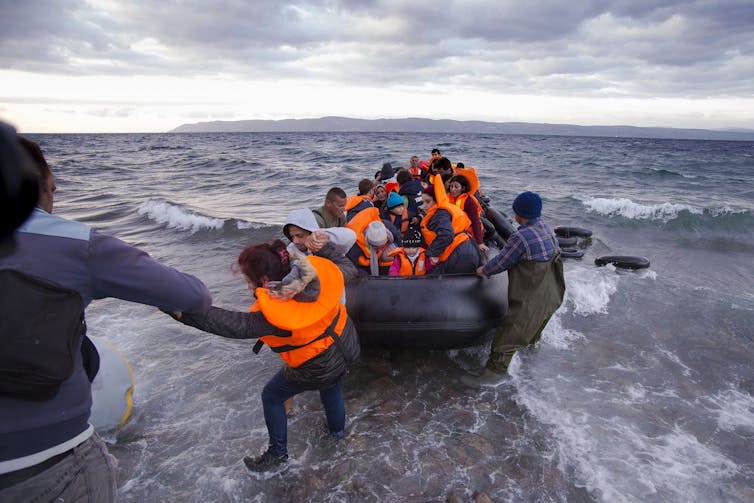As prime minister, Rishi Sunak has been unable to “stop the boats”, his pledge on addressing irregular migration. Now, Keir Starmer is pitching an equally memorable slogan: “smash the gangs”.
Labour’s plan is to take a counter-terrorism approach to people smuggling. Starmer pledged that the UK would become “hostile territory” to smuggling gangs with the introduction of a new border security command.
Discussing smugglers as terrorists and part of organised crime is a popular view across the political spectrum. Italian prime minister Giorgia Meloni and Rishi Sunak recently pledged to hunt down smugglers and traffickers across the world.
This approach is used to justify the “war on smugglers”, as war was waged on terror or drugs. But every time it has been tried, it effectively becomes a war on migrants.
One example is the Nationality and Borders Act, passed in 2022. This law made arriving in the UK without proper documentation, and facilitating this entry (smuggling), a criminal offence.
Today, most of the people being prosecuted for crossing the Channel and facilitating those crossings are not the criminal organisers of journeys in France or Belgium. They are young, often underage asylum seekers forced to steer dinghies or agreeing to do so in exchange for a free ride. The same goes for most prosecutions made in other major smuggling destinations like Italy, Spain and Greece.
Connections between smuggling and other forms of serious organised crime remain largely unverified. Extensive research shows that most smuggling is run by loose, small-scale and highly replaceable groups, far from the organised crime syndicates involved in international drug trafficking or terrorist networks.
Read more: Illegal immigration: cracking down on smuggling makes gangs more organised – and costs migrant lives
Starmer has pledged to set up a specialised border security command to bring together investigators from the National Crime Agency, Border Force, Immigration Enforcement, the Crown Prosecution Service and MI5. This doesn’t sound too different from previous attempts to centralise security and intelligence agencies in counter-smuggling efforts.
In 2020, Boris Johnson and Priti Patel launched the Channel Threat Command, a specialised operational unit whose aim was to make Channel crossings unviable. In April 2022, the unit was brought under the Ministry of Defence, who handed leadership back to the Home Office just a few months later.
Other longstanding interagency task forces (such as Project Invigor) already exist to fight organised immigration crime. They have been successful at gathering and sharing intelligence with Europol and supporting their European counterparts to coordinate international arrests.
But police agencies know that this approach is firefighting, and has not ended smuggling as a practice. British and French cooperation on small boat crossings also has yet to prove effective.
Starmer has indicated Labour will apply MI5 counter-terrorism approaches to tackle Channel crossings. For years, Italy used its elite anti-mafia units to track and dismantle smuggling networks across the Mediterranean. But this did not yield the results they hoped.
They ultimately realised that the most effective way to reduce boat crossings was to fund the Libyan coast guard’s pushback operations, despite evidence of collusion with smugglers organising the journeys and of human rights violations.
Smugglers can surely be vile and exploitative. But counter-smuggling operations don’t reduce harm to migrants. On the contrary, they displace migration routes to more dangerous regions and increase demand for smugglers’ services.
Fixing Britain’s asylum system
Starmer has also pledged to scrap the Rwanda removal policy and address the asylum backlog by speeding up decisions, and removing those with no right to stay to their countries of origin. Ending the unlawful and cruel Rwanda policy is a necessary step. But deporting people back to their home country is not as easy as it seems – this is partly why the government reached out to Rwanda in the first place.
A removals policy requires bilateral agreements with migrants’ countries of origin. The agreement signed by the Conservative government with Albania in 2022 led to two and half times more returns of Albanian nationals in 2023-24 than previous years.
But the top five nationalities of people crossing the Channel on a small boat (according to 2023 data) were Afghanistan (19%), Iran (12%), Turkey (10%), Eritrea (9%) and Iraq (9%). These are countries with ample evidence of human rights violations.
Home office data shows that the vast majority of people crossing the Channel in 2023 would be recognised as refugees if their applications were processed. And in the case of Afghanistan, Iran and Iraq, the UK has no straightforward diplomatic relations to implement returns in the first place.

Labour maintains they would not return refugees to Syria or Taliban-controlled Afghanistan, and would focus on removing people who do not qualify for asylum in the UK. But returning someone to Pakistan, India or Vietnam requires those countries to agree to such returns.
The governments of most migrant-sending countries are not particularly inclined to facilitate returns because of how unpopular forced returns are domestically, especially to the eyes of communities that rely on remittances sent by family members living abroad. Starmer indicated in the first leader debate that he would be open to other third-country processing schemes if they complied with international law.
Immigration is a top concern for UK voters, and one that any new administration will have to address. It is remarkable that politicians appear to be insistent on repeating failures, rather than learning from successes.
The current government successfully set up asylum and immigration schemes for people from Ukraine and Hong Kong. No Ukrainian refugee has drowned in the Channel. More than 120,000 people moved from Hong Kong to the UK since 2021 without anyone calling it an “invasion”.
Creating legal and safe routes is possible. These could put smuggling out of business and address the country’s labour shortages, without risking more lives and insecurity at the border.
David Suber receives funding from Economic and Social Research Council.
This article was originally published on The Conversation. Read the original article.







